

President’s Message, February 2024

Notes from the Apiary Inspector

2024 February 10 MEETING

UMBC Meeting Location Info: Parking, Vendors, Food!

Maryland Goes to NAHBE

Great Meeting in the Big Easy: ABF in New Orleans

“Life in the Hive” is a Model for Bee Education!

Quick Background on MD Senate Bill 278

Beekeeper’s Gallery, Winter 2024
MSBA Winter 2024 Meeting
- 2024 February 10 MEETING
DAY: Saturday, Febuary 10, 2024
TIME: 8:30 am - 4:00 pm
WHERE: BOTH In-Person and via ZOOM. (HYBRID)
In-Person Location: University of Maryland, Baltimore County, Interdisciplinary Life Sciences Building (ILSB), 1000 Hilltop Cir, Baltimore, MD 21250
LEARN - TONS! Insulating Hives, Pollen, Breeding, Drones, Yellow Legged Hornets & More
SPEAKERS - Bill Hesbach, Garett Slater, Cybil Preston, & MOREYou are not logged in. Please login TO VIEW THE RECORDING. Thanks!
2024 February 10 Meeting SCHEDULE
WHEN WHAT WHO 8:30 AM Refreshments, Coffee, Donuts, etc. 9:00 AM Opening and Welcome Mary Laura Fitzgerald, President 9:15 AM Why Vaccinate Your Bees for AFB? Nathan Reid of Dalan Animal Health, EAS Master Beekeeper 9:30 AM Genomic Breeding Dr. Garett Slater, USDA and University of Minnesota VIA ZOOM 10:30AM Pollen Bill Hesbach, of Wing Dance Apiaries, EAS Master Beekeeper 11:30 AM Yellow Legged Hornets: The Georgia Experience Christopher Adams of the Georgia Department of Agriculture VIA ZOOM 12 Noon EAS 2024 in Maryland: Updates and Announcements David Morris, former MSBA President, EAS Master Beekeeper, President EAS 2024 12:15 PM Lunch Bring your own or visit UMBC Commons (next door) 1:00 PM Maryland Apiary Inspector's Report Cybil Preston, MD State Inspector 1:30 PM Thermoregulation and Ventilation Bill Hesbach, of Wing Dance Apiaries, EAS Master Beekeeper 2:30 PM My Drone Research Dr. Garett Slater, USDA and University of Minnesota VIA ZOOM 3:30 PM Adjourn Mary Laura Fitzgerald, President DOOR PRIZE!
A copy of "Hive Tour:
The Insider's Guide to Honey Bees"
will be awarded in the morning!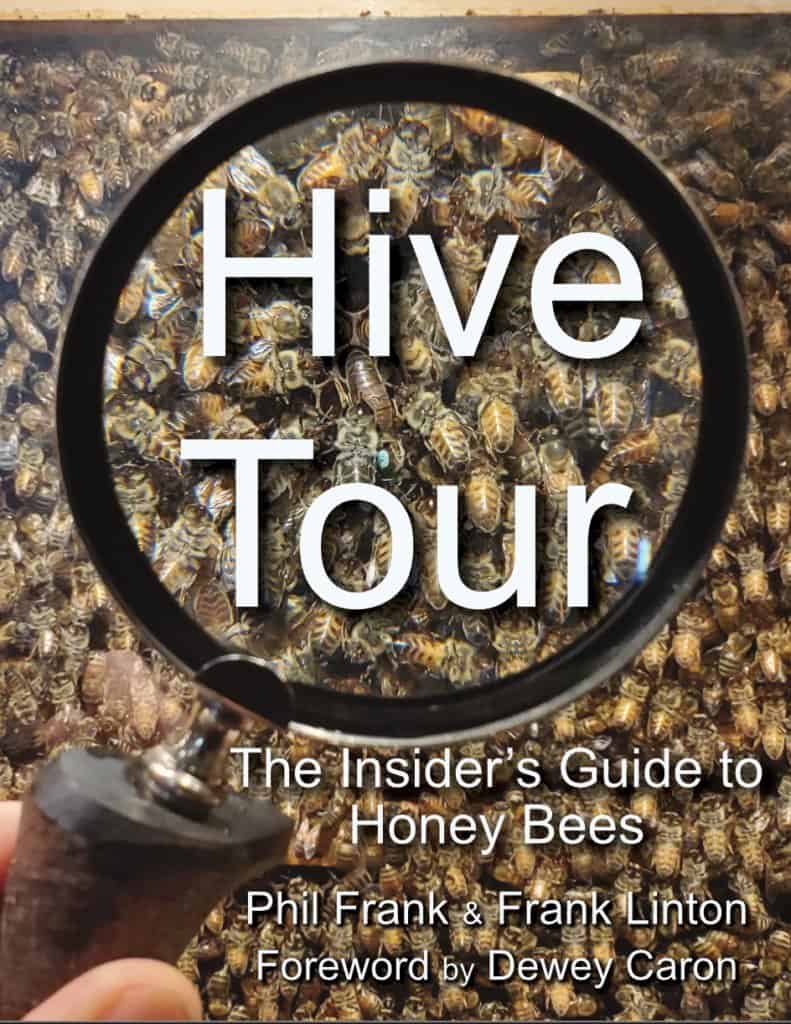
Bill Hesbach's Two Talks
Thermoregulation and Ventilation
The talk starts with how bees control the internal hive temperature during winter using thermoregulation and what effect that has on the colony. Then, we discuss convection flows inside a colony as a precursor to understanding ventilation. In the final segment, I introduce the concept of a condensing colony versus the more common practice of adding winter ventilation. Participants will better understand the roles that thermoregulation and ventilation play in a natural hive environment.
Pollen
Pollen, the miraculous germ cell of plants and the primary protein nutrient for bees, is the fertility key to every flowering plant and tree in the world. In this talk, we discuss how bees transfer pollen during pollination and how it’s digested as a protein source. Illustrated by striking photos, it’s a visual journey that will inform participants in ways that increase the joy of observing pollen on native plants, on the hind legs of bees, and stored as bee bread in cells.
Bill's Bio
Bill Hesbach is a Connecticut native with a background in engineering.
He's an Eastern Apicultural Society Certified Master Beekeeper, a graduate of the University of Montana's master beekeeping program, and the President of the Connecticut Beekeepers Association.
Bill also operates a sideline bee business called Wing Dance Apiary in Cheshire, CT., producing artisanal raw honey and other natural hive products.Bill teaches bee biology and various beekeeping methods at meetings hosted by regional beekeeping clubs. Bill is an active member of the Eastern Apicultural Society, where he is part of the Master Beekeeper Certification program. Bill is a regular guest speaker at national beekeeping seminars and was presented with the Distinguished Speaker Award at the 2019 EAS conference.
His special interests in beekeeping include bee biology, flight, and the connection between local flora and bee behavior. He's a published author, and his articles on beekeeping appear in The American Bee Journal and Bee Culture magazines.
Bill's book "Splits and Varroa" is available from Northern Bee Books HERE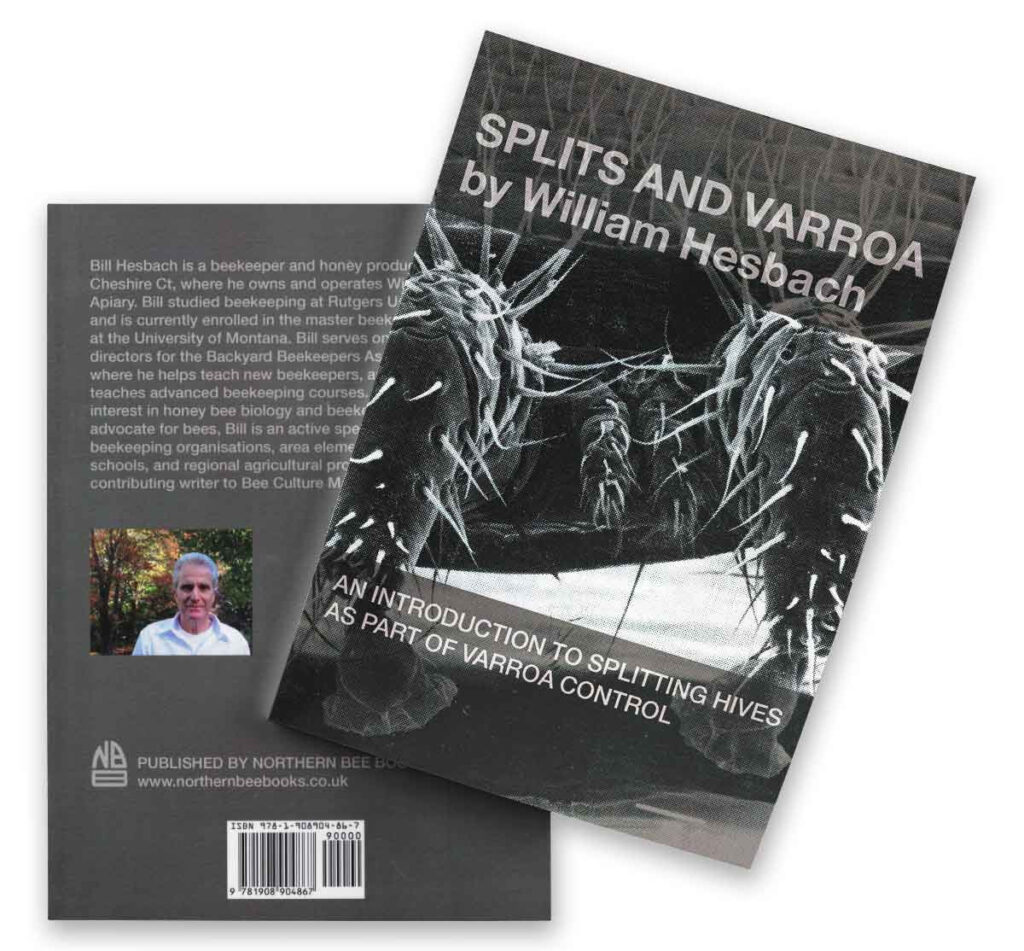
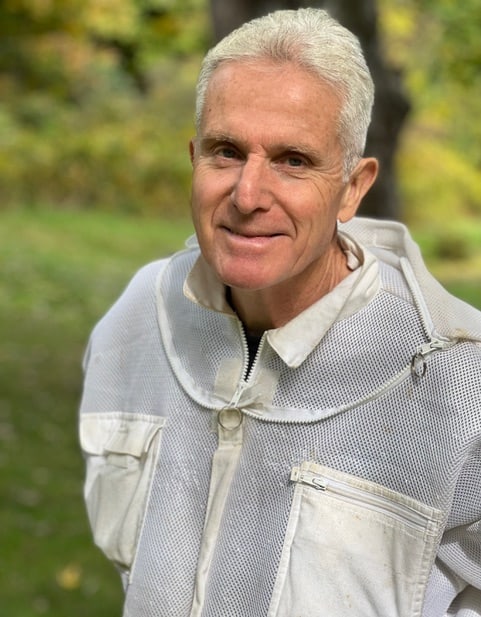
Garett Slater's Two Talks
Genomic Breeding
The field of genomics has experienced groundbreaking advancements in livestock breeding, revolutionizing trait selection and enhancement for various animal species. In sectors like cattle, pigs, and poultry, genomics has accelerated breeding programs by precisely identifying genetic markers linked to desirable traits. This knowledge enables breeders to make well-informed decisions, resulting in more focused and efficient strategies. These advancements have significantly improved livestock productivity, disease resistance, and other crucial characteristics. However, while genomics has shown great success in other agricultural contexts, its integration into honey bee breeding programs remains somewhat limited. Despite honey bees' critical role in pollination and ecosystem health, there is potential for expanding and developing genomics-driven breeding strategies. In this talk, I discuss strategies to implement genomics into breeding.
My Drone Research
Among the largest threats to colony health is queen failure. Shockingly, as many as 50% of commercial queens fail within 6 months. Beekeeper production relies on high quality queens, so queen failure is of deep importance to beekeepers and researchers alike. While much energy has focused on queen aspects of failure, we are increasingly discovering that drones play a more important role in queen quality than originally expected. Of drones which are sexually mature, as few as one in ten may be able to produce enough sperm to successfully inseminate a queen. If drones are not producing healthy sperm, their mates will not produce healthy colonies. Despite this, we have very little understanding of precisely why drone reproductive quality is low. In this talk, I will discuss drone biology, causes of poor drones, and what beekeepers can do to mitigate poor drone quality
Garett's Bio
Garett Slater is a Postdoctoral Fellow for the USDA. He obtained his PhD from Purdue University in 2022, with a thesis focused on applying modern genetic tools to honey bee breeding. Previously, he completed a MS in Nutrition and Queen Quality at North Dakota State University. Garett’s current research focuses on developing genomic tools for beekeeping, including selecting for natural defenses towards Varroa, pathogens, and other diseases. He has worked as a scientist and technician with the Bee Informed Partnership at the University of Minnesota for two years, directly supporting 30 commercial beekeepers in North Dakota. Garett has 12 years of beekeeping experience, including 8 years working for a large commercial beekeeper in North Dakota.
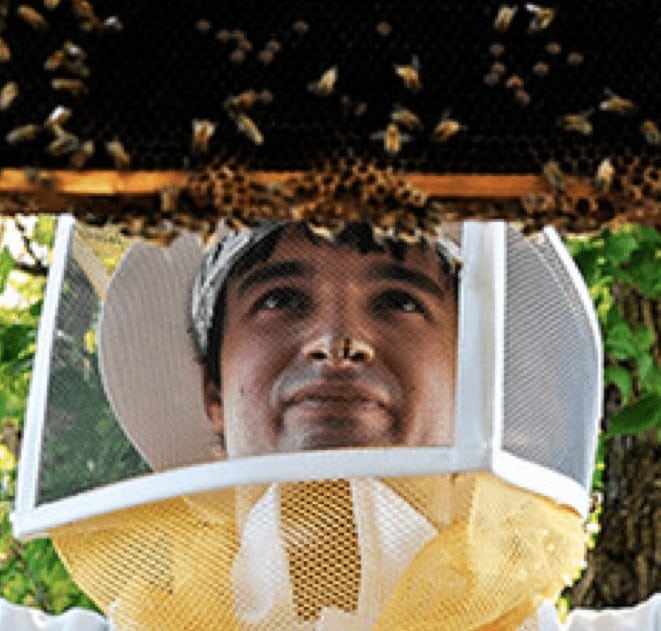
YELLOW LEGGED HORNET
The Georgia Department of Agriculture will give MSBA a private update on Vespa velutina - the Yellow-Legged Hornet (Formerly call the "Asian Hornet")
The first confirmed detection of a live Yellow-Legged Hornet was August 2023 Savannah, Georgia. The yellow-legged hornet poses a threat to honey bees and other pollinators.
Join our meeting to learn the latest. And if YOU spot one, HERE is where to report it.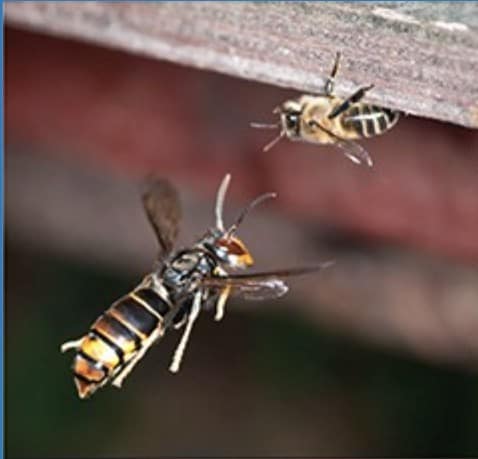
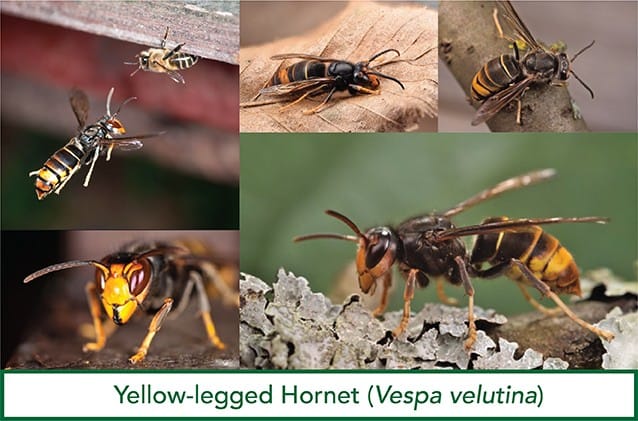
QUIZ: Can you identify which abdomen belongs to the Yellow-Legged Hornet??
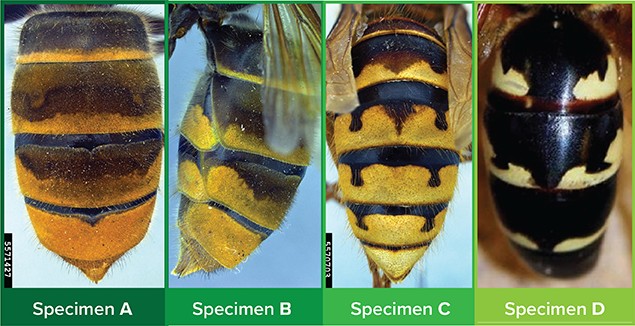
ZOOM DETAILS
Join Zoom Meeting
https://us06web.zoom.us/j/3634766759?pwd=Vm9SSWFnS0ZKRWlKdWc0YnVrQi83Zz09&omn=89929178562+1 301 715 8592 US (Washington DC)
Meeting ID: 363 476 6759
Passcode: 119523One tap mobile
+13017158592,,3634766759#,,,,119523# US (Washington DC) +13092053325,,3634766759#,,,,119523# USFind your local number: https://us06web.zoom.us/u/kdEiSulivW
MSBA 2024 Board of Directors
| Executive Board | |||
|---|---|---|---|
| President | Mary Laura Fitzgerald | themarylaura58@gmail.com | |
| Past President | Fred Smith | f.smith@myactv.net | |
| First V.P. | David Schultz | dschultz@specializedengineering.com | |
| Secretary | Toni Burnham | dcbees@dcbeekeepers.org | |
| Treasurer | Lisa Ghezzi | lisa.ghezzi@icloud.com | |
| Director | Valerie Wampler | valwampler@yahoo.com | |
| Director | Doug Shuman | dougshumansr@gmail.com | |
| Director | Russell Sprangel | sprangel@comcast.net | |
| SECOND VPs (County Reps) | |||
| Allegany | Ben Cooper | cooperville@atlanticbb.net | |
| Anne Arundel | Ryan Smith | ryansmith@honeysmithbees.com | |
| Baltimore | Regina Andrew | regina.andrew@comcast.net | |
| Baltimore City | Rob Yochem | ryochem@gmail.com | |
| Calvert | Susan Polsky | sarabellbees@md.metrocast.net | |
| Caroline | Paul Dill | (302) 249-1866 | |
| Carroll | Monica Schmitt | thebeelady@missionbeelieve.com | |
| Cecil | Brad Luff | bradfordluff@verizon.net | |
| Charles | Erik Darm | erik.darm@gmail.com | |
| Dorchester | |||
| Frederick | Mike Raide | mike.raide@gmail.com | |
| Garrett | Brittany Llewellyn | llewellynfarms@hotmail.com | |
| Harford | Harry Dutcher | bspaboy@comcast.net | |
| Howard | Bill Glover | williamglover@verizon.net | |
| Kent | Dave Kyger | davidkyger@mac.com | |
| Montgomery | Len Greig | lgreig3@verizon.net | |
| Prince Georges | Michael Mehalick | michaelrmehalick@gmail.com | |
| Queen Anne’s | |||
| Somerset | Crystal Lehmanking | a.mellifera.a@gmail.com | |
| St. Mary’s | Diane Wellons | deezltownbeez@gmail.com | |
| Talbot | Lisa Ghezzi | lisa.ghezzi@icloud.com | |
| Washington | Scott Edie | scottaedie@gmail.com | |
| Wicomico | |||
| Worcester | Thomas Babcock | tbabcock0001@gmail.com | |
| Washington, DC | Jan Poston Day | jan@secondstoryhoney.com | |
